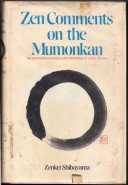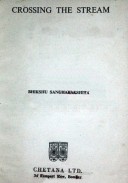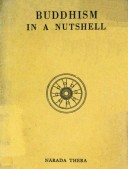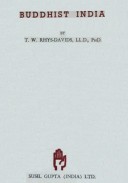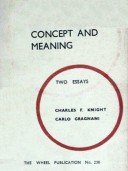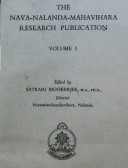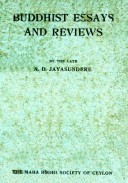Tìm Sách
Sách tiếng Anh-English >> Zen Comments On The Mumonkan
Thông tin tra cứu
- Tên sách : Zen Comments On The Mumonkan
- Tác giả : Zenkei Shibayama
- Dịch giả : Sumi Kudo
- Ngôn ngữ : Anh
- Số trang : 361
- Nhà xuất bản : Harper & Row Publishs
- Năm xuất bản : 1974
- Phân loại : Sách tiếng Anh-English
- MCB : 12010000004058
- OPAC :
- Tóm tắt :
ZEN COMMENTS ON THE MUMONKAN
ZENKEI SHIBAYAMA
Head of the Nanzenji Organization of Temples
Formerly Zen Master of Nanzenji Monastery, Kyoto
Translated into English by SUMIKO KUDO
HARPER & ROW, PUBLISHS
New York, Evanston, San Francisco, London
With this volume an outstanding source of practical Zen teaching at long last becomes available to English-speaking readers. Not an interpretation, but rather a work of direct presentation, it may well become the standard by which to judge other writings about Zen. Translated from the running comments by one of Japan’s most respected Zen masters, ZEN COMMENTS ON THE MUMONKAN offers for the first time in English pure hard-hitting Zen instruction much as it would be transmitted to monk in a Japanese monastery.
The basis of the book is the Mumonkan, a classic collection of 48 cryptic saying or koan commonly used in monastic training. The koan themselves were gathered by the thirteen-century Chinese Master Mumon and discussed first by him. Making the original work even more attractive and exciting are the forceful short poems Master Mumon appended to each of his discussions. Sharing the insights of a long life of disciplined religious seeking and teaching, Zenkei Shibayama has added his own comments on the koan themselves and on the commentaries and poem by Master Mumon.
The effect produced by Shibayama Roshi’s repeated clarifications and illustrations is a revelation for the Western reader. Through concentrated attention first to the words of the original author and then to those of a modern commentator, he is led as near to a sense of what satori implies as is possible without actual Zen discipline and experience. The lively translation into English is done by Sumiko Kudo, herself a follower of Zen and a student of Shibayama Roshi. A glossary is included which identifies names, places and writings, and clarifies the Zen meaning of terms which might be unfamiliar to some readers.
CONTENTS
Preface by Kenneth W. Morgan
Introduction by Shibayama Roshi
ZEN COMMENTS ON THE MUMONKAN
Shuan’s Preface to the Mumonkan
Dedication to the Throne by Monk Ekai
Master’s Mumon’s Preface to the Mumonkan
KOAN
1. Joshu’s “Mu”
2. Hyakujo and a Fox
3. Gutei Raises a Finger
4. The Foreigner has no Beard
5. Kyogen’s man up a Tree
6. Sakyamuni holds up a Flower
7. Joshu says “Wash your Bowls”
8. Keichu makes Carts
9. Daitsu Chisho
10. Seizei, a poor Monk
11. Joshu sees the True Nature of two Hermits
12. Zuigan calls “Master”
13. Tokusan carried his Bowls
14. Nansen kills a cat
15. Tozan gets sixty Blows
16. Bell-sound and Priest’s robe
17. The National teacher calls three times
18. Tozan’s three pounds of Flax
19. Ordinary mind is Tao
20. A man of great strength
21. Unmon’s Shit-Stick
22. Kasho and Flagpole
23. Think never good nor Evil
24. Abandon worlds and speaking
25. Talk by the Monk of the third seat
26. Two Monk rolled up the bamboo blinds
27. Neither mind nor Buddha
28. Well-known Ryutan
29. Neither the Wind nor the Flag
30. Mind is Buddha
31. Joshu saw through the old woman
32. A non-Buddhist questions the Buddha
33. No mind , no Buddha
34. Wisdom is not Tao
35. Sen-Jo and her soul are separated
36. Meeting a man of Tao on the way
37. The Oak tree in the front garden
38. A buffalo passes through a window
39. Unmon says “you have missed it”
40. Kicking over the Pitcher
41. Bodhidharma and peace of mind
42. A woman comes out of meditation
43. Shuzan and a staff
44. Basho and a stick
45. Who is he?
46. Step forward from the top of a pole
47. Tosotsu’s three barries
48. Kempo’s one way
APPENDEX
Mumon’s postscript
Mumon’s zen warnings
Muryo Soju’s poems on Oryo’s three barries
Mokyo’s epilogue
Amban’s forty-ninth talk
Glossary
Index
 Facebook
Facebook
 Google
Google
 Google+
Google+
